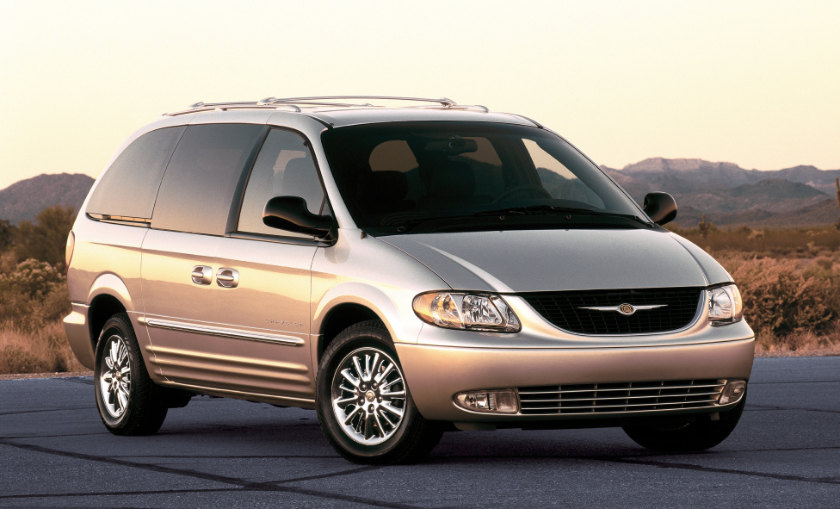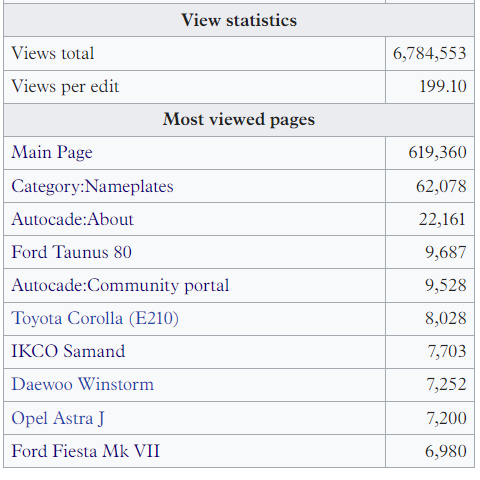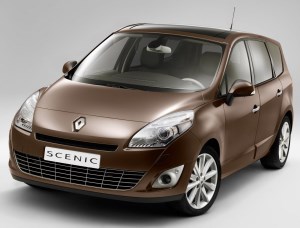
Above: The Levdeo (or Letin) i3, not exactly the ideal model with which to commemorate another Autocade milestone.
Autocade will cross the 23 million page view mark today, so we’re keeping fairly consistent with netting a million every three months, a pattern that we’ve seen since the end of 2019.
Just to keep my record-keeping straight:
March 2008: launch
April 2011: 1,000,000 (three years for first million)
March 2012: 2,000,000 (11 months for second million)
May 2013: 3,000,000 (14 months for third million)
January 2014: 4,000,000 (eight months for fourth million)
September 2014: 5,000,000 (eight months for fifth million)
May 2015: 6,000,000 (eight months for sixth million)
October 2015: 7,000,000 (five months for seventh million)
March 2016: 8,000,000 (five months for eighth million)
August 2016: 9,000,000 (five months for ninth million)
February 2017: 10,000,000 (six months for 10th million)
June 2017: 11,000,000 (four months for 11th million)
January 2018: 12,000,000 (seven months for 12th million)
May 2018: 13,000,000 (four months for 13th million)
September 2018: 14,000,000 (four months for 14th million)
February 2019: 15,000,000 (five months for 15th million)
June 2019: 16,000,000 (four months for 16th million)
October 2019: 17,000,000 (four months for 17th million)
December 2019: 18,000,000 (just under three months for 18th million)
April 2020: 19,000,000 (just over three months for 19th million)
July 2020: 20,000,000 (just over three-and-a-half months for 20th million)
October 2020: 21,000,000 (three months for 21st million)
January 2021: 22,000,000 (three months for 22nd million)
April 2021: 23,000,000 (three months for 23rd million)
I see on my 22 millionth page view post I mentioned there were 4,379 entries. It hasn’t increased that much since: the site is on 4,423. I notice the pace does slow a bit once the year kicks off in earnest: it’s the Christmas break that sees me spending a bit more time on the website.
Who knows? I may spend more on it again as I’m tiring of the tribalism of Twitter, and, most recently, being tarred with the same brush as someone I follow, even though I follow people I don’t always agree with—including people with offensive views.
On April 4, I wrote there:
Earlier today @QueenOliviaStR and I were tagged into a lengthy thread, to which I don’t think I have the right of response to the writer.
First up, I salute her. Secondly, she may disagree with how I use Twitter but I still support her. Thirdly, she should rightly do what she needs to in order to feel safe.
I don’t wish to single out any account but if you go through my following list, there are people on there whose views many Kiwis would disagree with.
Some were good people who fell down rabbit holes, and some I’ve never agreed with from the start. So why do I follow them?
As I Tweeted last week, I object to being in a social media bubble. I think it’s unhealthy, and the cause of a lot of societal angst. It’s why generally I dislike Big Tech as this is by design.
Secondly, if I shut myself off to opposing views, even abhorrent ones, how do I know what arguments they are using in order to counter them if the opportunity arises?
I would disagree that I am amicable with these accounts but I do agree to interacting with some of them on the bases that we originally found.
Ian, who is long gone from Twitter after falling down the COVID conspiracy rabbit hole, was a known anti-war Tweeter. I didn’t unfollow him but I disagreed with where his thoughts were going.
The person who tagged us today didn’t want to be exposed to certain views and that’s fair. But remember, that person she didn’t like will also be exposed to her views through me.
I’ll let you into something that might shock you: for a few years, when the debate began, I wasn’t supportive of marriage equality, despite having many queer friends. It was more over semantics than their rights, but still, it isn’t a view I hold today.
If this happened in social media land, I might have held on those views, but luckily I adopted the policy I do today: see what people are saying. And eventually I was convinced by people who wrote about their situations that my view was misinformed.
And while my following an account is not an endorsement of its views, by and large I follow more people with whom I agree—which means the positive arguments that these people make could be seen by those who disagree with them.
People should do what is right for them but I still hold that bubbling and disengagement are dangerous, and create a group who double-down on their views. Peace!
Maybe it’s a generational thing: that some of us believe in the free flow of information, because that was the internet we joined. One that was more meritorious, and one where we felt we were more united with others.
We see what the contrary does. And those examples are recent and severe: we’ve seen it with the US elections, with Myanmar, with COVID-19.
This isn’t a dig at the person who took exception to my being connected to someone, and yes, even engaged them (though being ‘amicable’ is simply having good manners to everyone), because if those offensive views targeted me I wouldn’t want to see them. And it is a poor design decision of Twitter to still show that person in one’s Tweets if they have already blocked them, just because a mutual person follows them.
It is a commentary, however, on wider trends where social media and Google have created people who double-down on their views, or opened up the rabbit hole for them to fall into—and keep them there.
It did use to be called social networking, where we made connections, supposedly for mutual benefit, maybe even the benefit of humanity, but now it’s commonly social media, because we don’t seem to really network with anyone else while we post about ourselves.
Unlike Alice, people don’t necessarily return from Wonderland.
My faith—which I don’t always bring up because one risks being tarred with the evangelical homophobic stereotypes that come with it in mainstream media and elsewhere—tells me that everyone can be redeemed, even those who hold abhorrent views.
It’s why I didn’t have a problem when Bill Clinton planned to see Kim Jong Il or when Donald Trump did see Kim Jong Un, because engagement is better than isolation. Unlike the US media, I don’t change a view depending on the occupant of the Oval Office.
I’ve also seen some people who post awful things do incredibly kind things outside of the sphere of social media.
Which then makes you think that social media just aren’t worth your time—something I had already concluded with Facebook, and, despite following mostly people I do agree with, including a lot of automotive enthusiasts, I am feeling more and more about Twitter. Instead of the open forum it once was, you are being judged on whom you follow, based on isolated and rare incidents.
I don’t know if it’s generational or whether we’ve developed through technology people who prefer tribalism over openness.
Sometimes you feel you should just leave them to it and get on with your own stuff—and for every Tweet I once sent, maybe I should get on to some old emails and tidy that inbox instead. Or put up one of the less interesting models on Autocade. Not Instagramming much—I think I was off it for nearly a month before I decided to post a couple of things on Easter Eve—has been another step in the right direction, instead of poking around on a tiny keyboard beamed up to you from a 5½-inch black mirror.
The computer, after all, is a tool for us, and we should never lose sight of that. Let’s see if I can stick with it, and use Mastodon, which still feels more open, as my core social medium for posting.







